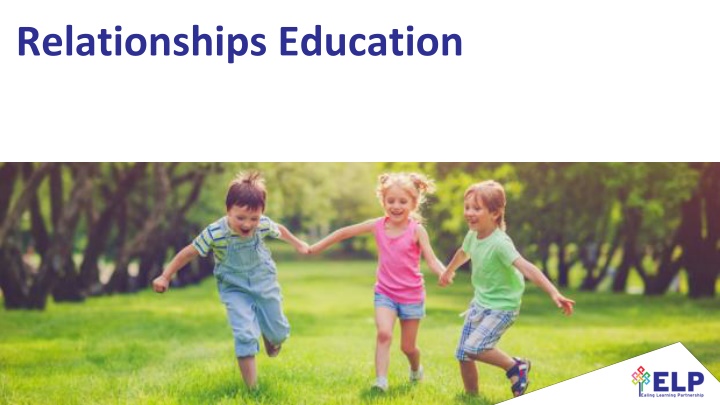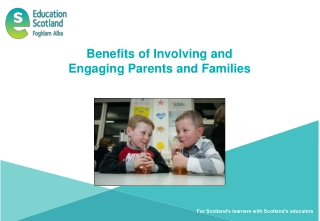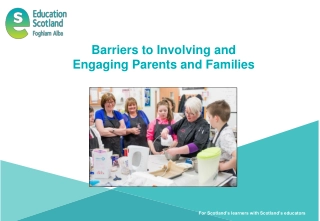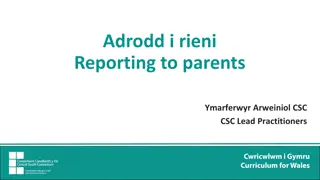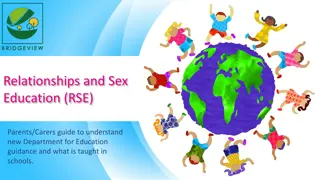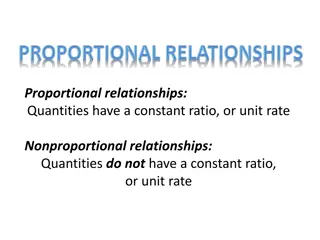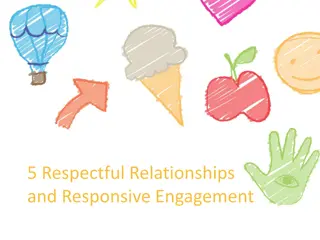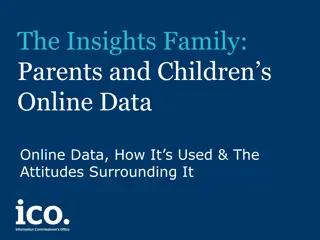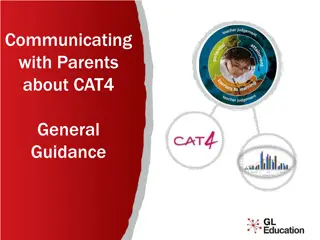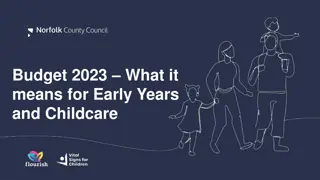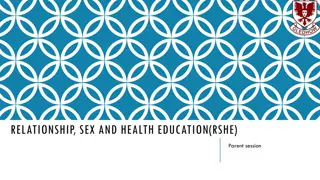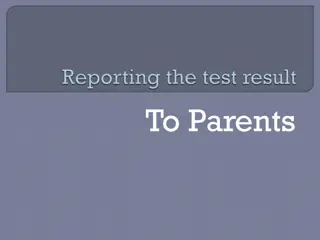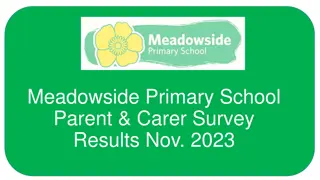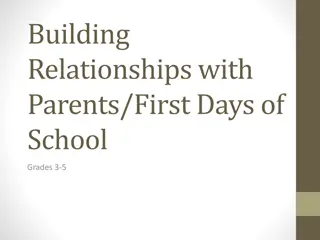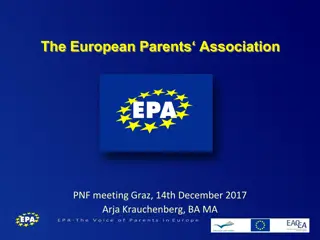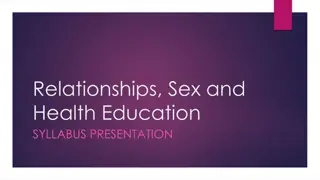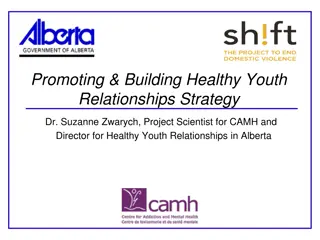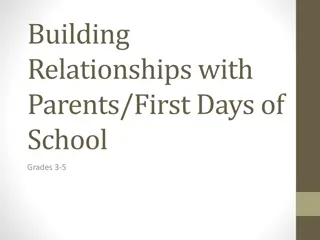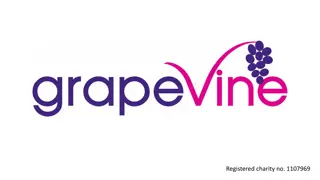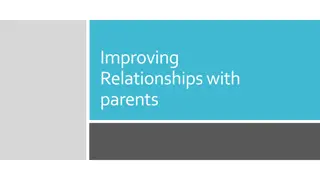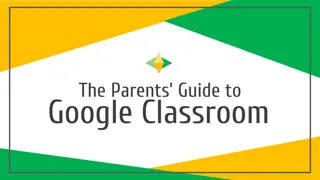Relationships Education: What Parents Should Know
In this parent workshop, understand the new curriculum changes regarding Relationships Education and why it is crucial. Learn about the expectations and lesson plans related to Relationships Education and RSE. Discover the significance of teaching children about relationships, boundaries, online safety, and more for their overall well-being and development.
Download Presentation

Please find below an Image/Link to download the presentation.
The content on the website is provided AS IS for your information and personal use only. It may not be sold, licensed, or shared on other websites without obtaining consent from the author.If you encounter any issues during the download, it is possible that the publisher has removed the file from their server.
You are allowed to download the files provided on this website for personal or commercial use, subject to the condition that they are used lawfully. All files are the property of their respective owners.
The content on the website is provided AS IS for your information and personal use only. It may not be sold, licensed, or shared on other websites without obtaining consent from the author.
E N D
Presentation Transcript
Parent workshop aims To explain to parents/carers - New curriculum changes What Relationships Education is and why it is important Expectations for Relationships Education RSE within the curriculum Lesson plans/overviews
New curriculum changes Relationships education is now statutory back to summer term of 2021 Forms part of the PSHE (personal, social, health and economic) curriculum. Relationships education is compulsory compulsory in primary schools Sex education is NOT compulsory Sex education is NOT compulsory one lesson in Year 6 which parents have the one lesson in Year 6 which parents have the right to withdraw right to withdraw Guidance states that primary schools should teach relationships and health including puberty this is compulsory compulsory Taught in the Summer Term from Nursery to Year 6. Puberty lessons are covered in Years 4, 5 and 6. Relationships Education also covers keeping safe, good and bad touch, people who help us, good friendships and peer pressure. These lessons are taught throughout the year. statutory beginning September 2020 pushed
What is Relationships Education? Pupils will be taught about what a relationship and friendship means. What family means and who the people are who can support them. Early years focus on supporting and teaching children how to take turns, how to treat each other with kindness, consideration and respect. Most importantly, teaching children about honesty and truthfulness, permission seek and giving and concept of personal privacy. Healthy relationship features, family relationships and other relationships children might encounter. Online safety Building strong and positive relationships what a good friend is Positive emotional and mental well being friendships supporting this
Why is Relationships Education important? Safe school community grow, learn and develop positive, healthy behaviour for life Protect and safeguard children Safety and risks in relationships Prepare children for challenges, opportunities and responsibilities in adolescence/high school/teen years Positive impact on health and wellbeing Ability to achieve Protect children from inappropriate online content and what to do if they come across this or how to deal with cyber-bullying
Relationships Education and RSE Recognise and to report abuse when suspecting or knowing that something is wrong Boundaries and privacy Right over their own bodies Boundaries in friendships with peers/families Online safety
Relationships Education themes Families and people who care for me Caring friendships Respectful relationships Online relationships Being safe
End of the year expectations: Families and people who care for Families and people who care for me that families are important for children growing up because they can give love, security and stability. the characteristics of healthy family life healthy family life, commitment to each other, including in times of difficulty, protection and care for children and other family members, the importance of spending time together and sharing each other s lives. that others families, either in school or in the wider world, sometimes look different family, but that they should respect those differences and know that other children s families are also characterised by love and care. that stable, caring relationships stable, caring relationships, which may be of different types, are at the heart of happy families, and are important for children s security as they grow up. that marriage represents a formal and legally recognised commitment of two people to each other which is intended to be lifelong. how to recognise if family relationships are making them feel unhappy or unsafe, and how to seek help or advice from others if needed. me sometimes look different from their
End of the year expectations: Caring Caring friendships friendships how important friendships are in making us feel happy and secure people choose and make friends. the characteristics of friendships characteristics of friendships, including mutual respect, truthfulness, trustworthiness, loyalty, kindness, generosity, trust, sharing interests and experiences and support with problems and difficulties. that healthy friendships healthy friendships are positive and welcoming towards others, and do not make others feel lonely or excluded. that most friendships have ups and downs, and that these can often be worked through so that the friendship is repaired or even strengthened friendship is repaired or even strengthened, and that resorting to violence is never right. how to recognise who to trust and who not to trust recognise who to trust and who not to trust, how to judge when a friendship is making them feel unhappy or uncomfortable, managing conflict, how to manage these situations and how to seek help or advice from others, if needed. happy and secure, and how
End of the year expectations: Respectful relationships the importance of respecting others, even when they are very different from them (for example, physically, in character, personality or backgrounds), or make different choices or have different preferences or beliefs. practical steps they can take in a range of different contexts to improve or support respectful relationships. the conventions of courtesy and manners. the importance of self-respect and how this links to their own happiness. that in school and in wider society they can expect to be treated with respect by others, and that in turn they should show due respect to others, including those in positions of authority. about different types of bullying (including cyberbullying), the impact of bullying, responsibilities of bystanders (primarily reporting bullying to an adult) and how to get help. what a stereotype is, and how stereotypes can be unfair, negative or destructive. the importance of permission-seeking and giving in relationships with friends, peers and adults.
End of the year expectations: Online relationships that people sometimes behave differently online, including by pretending to be someone they are not. that the same principles apply to online relationships as to face-to face relationships, including the importance of respect for others online including when we are anonymous. the rules and principles for keeping safe online, how to recognise risks, harmful content and contact, and how to report them. how to critically consider their online friendships and sources of information including awareness of the risks associated with people they have never met. how information and data is shared and used online.
End of the year expectations: Being safe what sorts of boundaries are appropriate in friendships with peers and others (including in a digital context). about the concept of privacy and the implications of it for both children and adults; including that it is not always right to keep secrets if they relate to being safe. that each person s body belongs to them, and the differences between appropriate and inappropriate or unsafe physical, and other, contact. how to respond safely and appropriately to adults they may encounter (in all contexts, including online) whom they do not know. how to recognise and report feelings of being unsafe or feeling bad about any adult. how to ask for advice or help for themselves or others, and to keep trying until they are heard. how to report concerns or abuse, and the vocabulary and confidence needed to do so. where to get advice e.g. family, school and/or other sources.
Do I have the right to withdraw my child from RSE? Sex Education is covered in year 6 only you have the right to withdraw your child from this lesson. All PSHE and RSE is statutory and compulsory for the rest of the school you do not have the right to withdraw as set out in the government national curriculum and guidelines.
Health Education Mental wellbeing Internet safety and harms Physical health and fitness Healthy eating Drugs, alcohol and tobacco Health and prevention Basic first aid Changing adolescent body
Learning objectives for Relationships Education
Relationships Education vocabulary list
Questions? Do you have any questions about the policy?
